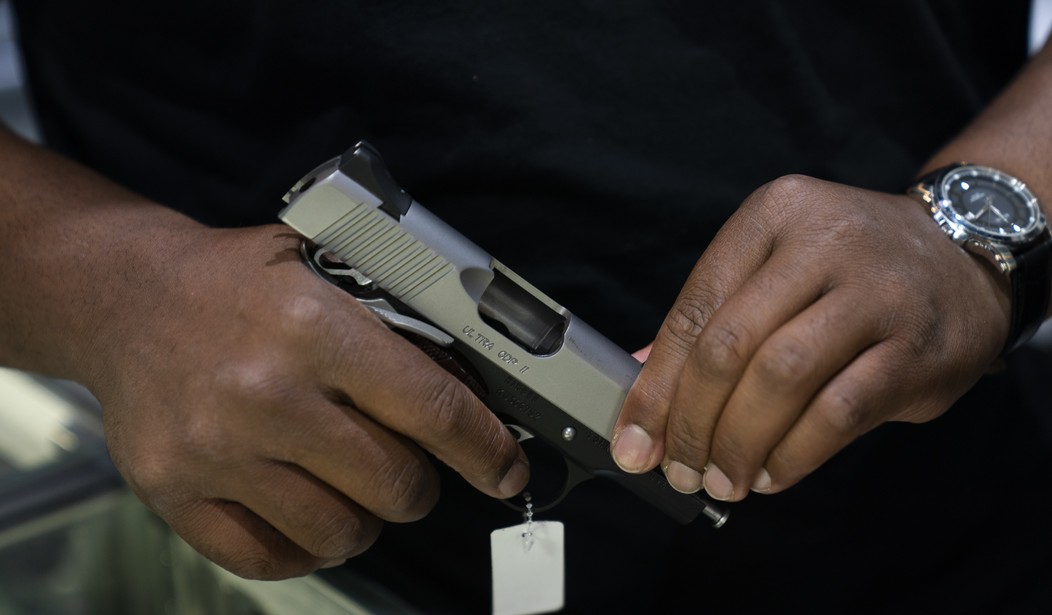Consider this an eye-rolling followup to yesterday’s story about one of the unenforceable aspects of I-1639; the Washington State ballot initiative approved four years ago that imposed a host of new restrictions on gun owners and gun sellers in the state. One of the provisions of the initiative directed the state to conduct annual background checks on every resident in the state who owns a semi-automatic handgun or rifle, but after doing their research officials concluded that there was no easy or cost-effective way to implement the new law; at least not without the state legislature imposing a gun registration requirement in the state.
Despite that fact, the editorial board of the Columbian newspaper is out with a new op-ed complaining about the unenforced provision; or rather, the fact that the unenforceable law isn’t somehow being enforced anyway.
The fundamental questions: What good is a law if it is not enforced? And what impact does ignoring a particular law have on the behavior of the public?
Well, I-1639 isn’t a good law to begin with, and given that even supporters of the provision were unaware that it hasn’t been enforced I doubt that the “ignoring” of the law has had much of an impact on the public. But as I pointed out yesterday, even if the state had figured out a way to conduct background checks on all current owners of semi-automatic handguns and rifles, that wouldn’t lead to them being taken away from any prohibited person. California’s Armed Prohibited Persons System is supposed to do just that, and yet as of just a few months ago the state has a backlog of more than 26,000 cases; all individuals who are believed to be in illegal possession of a firearm. And this isn’t a new problem either.
In 2013, Attorney General Kamala Harris’ staff first acknowledged a growing backlog of some 20,000 APPS cases. DOJ staff testified at a joint legislative hearing that if given $24 million to increase staffing, the backlog could be cleared within a year. Based on that testimony, legislators passed a bipartisan bill allocating the funding and requiring DOJ to report annually on program staffing and progress clearing the backlog.
By December 2015, Attorney General Harris’ slow progress in clearing the backlog was evident – there were still 20,490 cases on the APPS list, and only 54 of 75 agent positions for the program were filled.
Senate Republicans’ many calls for an audit and oversight hearings to learn why the backlog remained largely went ignored.
Under Attorney General Xavier Becerra’s leadership, enforcement regressed. Despite increased APPS funding, in January 2018 there remained a backlog of 22,574 cases — 10,226 Active and 12,348 Pending.
Senate Republicans, concerned by the regression, met with Becerra in April 2018. He committed to providing a plan to address the APPS backlog. That plan never materialized and the backlog continued to grow.
Current Attorney General Rob Bonta presented his first APPS report this March. He spoke of clearing “more than 8,900 individuals from the APPS list” and seizing “almost 1,500 firearms” from them, calling it “a public safety success story.”
The real story is in the backlog numbers, which are higher than ever. Bonta, recognizing this problem, shamelessly tried to minimize the increased backlog by breaking out a new category of cases from the total – the incarcerated.
From the report: “As of January 1, 2022, the APPS database had 24,509 armed and prohibited persons and 1,130 additional armed and prohibited individuals who were incarcerated.”
California lawmakers have been throwing millions of dollars at APPS for close to a decade, and the backlog is bigger than ever. Perhaps the question the Columbian editors should be asking is “what good is a law that can’t be easily enforced?”
Following the passage of I-1639, the state Department of Licensing was tasked with developing a “cost-effective and efficient process” for conducting annual background checks, according to Crosscut. In July 2020, department officials concluded that such a program was not feasible, and Gov. Jay Inslee has said the Legislature likely will need to weigh in on the process. “The issue is that there is not a way to legally conduct the check under our current system,” an Inslee spokesperson said.
It should be noted that background checks for new gun purchases are, indeed, conducted in Washington. But voters in 2018 said they desire annual background checks for gun owners; if somebody is flagged in such a check, local law enforcement is notified and instructed to “take steps to ensure such persons are not illegally in possession of firearms.”
That in itself can be problematic. But it should not obfuscate the larger problem — an unenforced law is worse than no law at all.
Voters may have said they desire annual background checks for gun owners, but they weren’t informed that would mean the establishment of a gun registration system in order to do it. In fact, the organizers of I-1639 could have included a gun registry or gun owner licensing system among their other gun control initiatives, but they didn’t do so. The Columbian‘s editors still don’t seem to understand why the unenforced law isn’t being enforced, but I’m also confused about their desired outcome. Is this editorial a demand to repeal the unenforceable provision included in I-1639, a call for a statewide registry of gun owners in order to start enforcing the law, or just wishful thinking that an unenforceable law can somehow be made effective through sheer willpower?
I’d be in favor of repealing I-1639 in its entirety, to be honest, and if we’re talking about power of enforcing the law maybe the Columbian should take a look at the clearance rates for major crimes across Washington State. What they find might surprise them. In 2020 (the last year for which we have data), for example, there were 50 homicides in Seattle; a 26-year high. And yet, according to the FBI’s Crime Data Explorer app, there were only 14 arrests for homicide in Seattle that year. Across the entire state there were 302 homicides, but only 186 arrests for murder and non-negligent manslaughter. Clearance rates for non-fatal shootings are harder to determine, but they’re generally far lower than the clearance rates for homicides.
There are a finite number of police officers in Washington State, and many departments are already woefully understaffed. Instead of wasting time and infringing on the rights of law-abiding citizens by trying to establish a gun registry and the Washington State equivalent of California’s APPS program, police need to be using targeted deterrence to precent crimes while cities bolster the funding for criminal investigations in order to clear more cases. Every unsolved murder and shooting is an unenforced violation of the law, but unlike I-1639’s annual background check on legal gun owners, that problem can be addressed without the need for any new legislation or intrusion on anyone’s constitutional rights.









